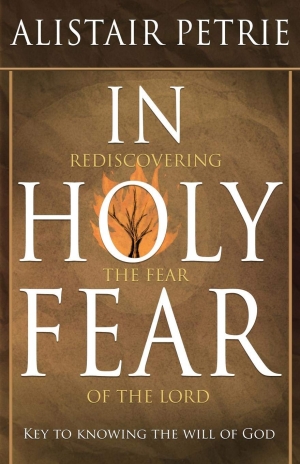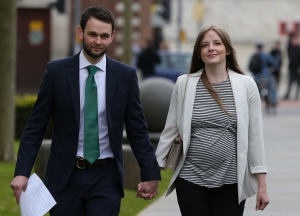Church Issues
Displaying items by tag: Lord
Through the Storm: Our Good Shepherd
Through the Storm: The Lord Is My Rock
Psalm 96 (Part 2)
The Great Sign of Our Age
Review: In Holy Fear
Equality, Tolerance and Freedom
The Ashers Bakery case goes to the Supreme Court.
This week, the Supreme Court left its usual place in London and has been sitting in Belfast to hear a case that has fundamental significance for the future of free speech in Britain. The Ashers Bakery case dates back to 2014 when an LGBT activist ordered a cake from the bakery with a message in the icing stating "Support Gay Marriage".
The owners of the bakery, Daniel and Amy MacArthur, who are committed Christians, refused to do this on the ground that it was against their beliefs. The initial judgment found that they were guilty of ‘discrimination’ and this was affirmed by the Court of Appeal. The case has now gone to the Supreme Court, but the Northern Ireland Attorney General, John Larkin QC, has already expressed his own opinion that the Court of Appeal was wrong in their judgment.
The case has attracted an enormous amount of interest because of its significance for our cherished freedom of speech. The central question is whether the law can force someone to make a statement that they do not believe.
The Law vs. Freedom of Speech
Does the law have the power to force a Catholic to make a statement criticising the Pope? Does the law have the power to force a Muslim to make a statement that is insulting to Mohammed? Does the law have the power to force any citizen to make a statement that is directly against his or her personal convictions?
This is a question that, for Christians, goes back 2,000 years to the time of the Roman Emperor Domitian in the year AD 95 when all citizens were required, on a certain day, to go to the local shrine dedicated to the Emperor and say "Caesar is Lord".
The case has attracted an enormous amount of interest because of its significance for our cherished freedom of speech.

For the MacArthurs, being forced to make a statement declaring support for homosexual marriage, which the Bible declares to be "detestable” to God (Lev 18:22) would be equivalent to denying their faith in the God of Creation and the Father of our Lord Jesus Christ. It would be the modern equivalent of saying "Caesar is Lord" and denying the Lordship of Jesus.
Significance for Equality Law
But there are significant legal aspects as well as moral aspects to this case, which is no doubt the reason why the five judges are not expected to announce their decision before the autumn and it may even be delayed to the beginning of next year. Their judgment has profound significance for the future of the Equality Commission and the interpretation of equality law in Britain.
This case is creating panic, not only among LGBTQ+ supporters but across the whole left-wing postmodernist philosophical camp, which has been driving the movement for social change and social engineering in the nation since the 1960s.
Suddenly, there is fear gripping the far-left political elite that they have gone too far, too quickly. They have had enormous success in achieving their objectives since the publication of the Gay Manifesto in 1972 declaring the LGBTQ+ intention of destroying the ‘family’ as the central pillar in the Judeo-Christian structure of the nation.
The judgment will have profound significance for the future of the Equality Commission and the interpretation of equality law in Britain.
The Idol of Equality
They have succeeded, probably beyond their wildest dreams, in persuading the nation that the supreme ethical values in society are ‘equality’ and ‘tolerance’ – that all ethical judgments should be taken at the bar of ‘equality’.
 Hence, postmodernists have even succeeded in changing the legal definition of marriage by framing it as an issue of ‘equality’. This worshipping of equality is a recycling of Marxism, which falsely assumes that enforced equality will lead to justice and a better world. Jordan Peterson rightly calls postmodernism the “new skin that the old Marxism now inhabits”.1
Hence, postmodernists have even succeeded in changing the legal definition of marriage by framing it as an issue of ‘equality’. This worshipping of equality is a recycling of Marxism, which falsely assumes that enforced equality will lead to justice and a better world. Jordan Peterson rightly calls postmodernism the “new skin that the old Marxism now inhabits”.1
Marxism was totally discredited through the fiasco of Communism last century, but it didn’t disappear entirely - later reappearing under the guise of postmodernism, trying yet again to force upon the population the flagship lie of ‘equality’.
But forcing a Christian baker to declare his support for gay marriage may prove to be a step too far which could cause the whole of their false edifice of society to collapse. It is like pulling out a single brick from the base of the Tower of Babel, sending a shockwave right through its structure that brings the whole lot down!
Enough is Enough
The central tragedy of recent history over the past half-century is that neither Church leaders nor politicians have understood the philosophy of postmodernism, with its objectives of destroying Judeo-Christian civilisation. The great question facing us now is: will there be a great awakening of common sense among ordinary people in the general public before it is too late?
The central tragedy of recent history is that neither Church leaders nor politicians have understood that postmodernism seeks to destroy Judeo-Christian civilisation.
Will ordinary people arise and say, "Enough is Enough! We do not want to be driven by Big Brother political correctness. We cherish our freedom of speech and we will not let our children be educated in schools that brainwash them in the false values of ‘equality and tolerance’ and ‘political correctness’.”
Is it too late to reclaim the nation from the clutches of those who wish to destroy Western civilisation?
To the Church of Sardis
The Apostle John had a message for the Christians in Sardis who were facing persecution by the Roman Empire. He warned "You have a reputation for being alive, but you are dead. Wake up! Strengthen what remains and is about to die” (Rev 3:1-2). The alternative was that their names would be blotted out of the Book of Life.
The warning signs are there today for those who have eyes to see and ears to hear. If we do not wake up soon and challenge those who are driving the nation towards self-destruction, we and our children and grandchildren will perish in the forthcoming holocaust of social destruction.
That destruction has already begun, the evidence of which can be seen all around us, in the breakdown of the family and the consequent rise in crimes of violence, lawlessness and corruption. But this is only the beginning – unless we wake up!
References
1 Jordan B Peterson, Postmodernism and Cultural Marxism. Interview, The Epoch Times, 6 July 2017.
God Save the Family
One voice in Westminster speaks volumes about Britain's social crisis.
In last week’s editorial we said that family breakdown was at the heart of many of the problems facing the NHS. Those problems continue to hit the headlines today and at least one voice in Westminster has recognised their source.
Lord Farmer, former Treasurer of the Conservative Party and outspoken advocate of family values has called for a ‘Minister for Family Breakdown’ to tackle the huge problems facing the nation.
Michael Farmer, a committed Christian, grew up in a chaotic family with alcoholic parents but became a successful businessman and has since devoted his life to championing the importance of strong and stable families in public policy. In an article in the Daily Telegraph this week he refers to the “devastating effect of family breakdown upon the lives of young people that affect their ability to succeed in life.”
He says that every department of Government is experiencing the costs of family breakdown and the public are at last beginning to recognise the serious problems it causes.
Family Matters
Politicians of all parties are guilty of causing the problems we are experiencing today. A new phase started in the year 1997, when the New Labour Government of Tony Blair had just been elected promising a whole new political arena. A lot of the new MPs were women – dubbed ‘Blair Babes’– some of whom had had a bad experience of marriage, and there was a lot of anti-men sentiment around in Westminster.
Divorce rates were high and family breakdown was just being recognised as a social problem. I was the Research Director of the Lords and Commons Family and Child Protection Group. Jack Straw MP was Home Secretary and he offered Home Office support for the research we were carrying out on the health of the family in the nation.
At least one voice in Westminster has recognised that much of our NHS crisis owes to family breakdown.
Our report ‘Family Matters’ was presented in Parliament in July 1998 at a packed meeting in the Moses Room at which Jack Straw accepted the report and promised Government action to strengthen family life in Britain. But the White Paper he promised he was never able to produce, due to strong opposition in the Cabinet from the rising anti-family lobby, whose mantra was “There’s nothing wrong with the family, it is just changing”. They said that all types of family were of equal value. This was ignoring the truth that had been known since the time of Aristotle, who defined the worst inequality as the treating of unequal things as equal.1
The Facts Ignored Lord Farmer of Bishopsgate, who has spoken out about the dire consequences of family breakdown. See Photo Credits.
Lord Farmer of Bishopsgate, who has spoken out about the dire consequences of family breakdown. See Photo Credits.
The report noted the complex character of family structures. It stated:
Social analysts now refer to ‘first marriages’, ‘remarriages’, ‘cohabiting couples’, ‘lone-mother families’, ‘lone-father families’, ‘step families’, ‘multi-parent families’ [where children spend some time with one parent and some time with another], ‘multi-sibling families’ [where children from different unions live in a single household with one parent, or stepparent, or other carer]…2
It was noted that these ‘re-constituted families’ not only placed a stress upon the adults involved, but they had strongly negative effects upon the children, in terms of health, education, peer group relationships and life chances.
Research for the Report found that 98% of children involved in persistent youth crime came from broken homes. It concluded that if the present rate of marriage and relationship breakdown continued, it would have catastrophic effects upon the lives of children and young people, and upon the future stability of the national social structure.
Two years later, July 2000, we published another report, ‘The Cost of Family Breakdown’ which stated:
Britain’s children are suffering as never before, family fragmentation is a major cause of poverty, inequality and social exclusion. Yet there are few attempts to engage with ideas to strengthen family and marriage. Research shows that children are twice as likely to suffer adverse outcomes from family breakdown as those from intact families. This is a huge disadvantage in education, emotional and physical health, and in life-chances for employment and personal fulfilment. But ‘political correctness’ produces a kind of conspiracy of silence to ignore the facts, the outcome of which is to institutionalise the disadvantage of children and to promote depression and mental instability among adults.3
All these facts have been known for at least the past 20 years and yet they continue to be ignored by politicians so that generations of children in Britain are being denied the right to a happy, healthy home life that will enable them to be fulfilled in adult life.
It is surely time for our politicians to be held accountable for their crimes against humanity by continuing to ignore the words of Jack Straw MP who stated, “The family is the building block of society and marriage is the ideal form of family life” (in the Green Paper ‘Supporting Families’, published by the Home Office in 1998).
The facts about family breakdown have been known for at least the past 20 years, and yet they continue to be ignored by politicians.
Church Complicity
Sadly, the Church has no better record than the politicians. When Jack Straw’s words were published, an Education Bill was going through Parliament. A Peer introduced an amendment to the Bill in the House of Lords to ensure that “marriage is the ideal form of family life” was included in what should be taught to children. Tony Blair’s Government opposed it (against its own Home Secretary) but so too did nine bishops.
If they had voted for the amendment, it would have been passed. How strange! The official representatives of the Church of England voted against a measure to teach children the value of faithful monogamous marriage! So, the Church colluded with the state to destroy the biblical basis of family and marriage in Britain.
Isn’t it time we Christians acknowledged our part in bringing upon the nation the troubles we are now seeing in our NHS and everywhere else in the life of the nation – our overflowing prisons, our neglected lonely old people, our children who know nothing of the teaching of the Bible about what is right and wrong? Jesus said that it would be better for those who cause children to sin to be thrown into the sea with a millstone tied round their neck (Luke 17:2).
It’s time to recognise that the Church has been part of the conspiracy of silence that has allowed the nation to reject its Judeo-Christian heritage. Surely, repentance and weeping before the Lord should be high in our priorities.
But if Lord Farmer is right that there is a shift in public opinion towards recognising the problems created by family breakdown – then surely it’s time for Christians to break their silence and join him in the battle against the powers of darkness!
References
1 ‘Aristotle's Axiom’. Peter, LJ, 1979. Peter's People. NY: Morrow.
2 Click here for the full report.
3 Cost of Family Breakdown. Family Matters Institute, Bedford, 2000, p80.
The Message of the Prophets: Hosea
In our series on the relevance of the prophets today, Howard Taylor looks at the heart-breaking symbolic message lived out by Hosea.
In many ways, the Israel of Hosea's time was similar to the wealthy Western society of today after the collapse of its former enemy, the Soviet Union. Israel had become affluent and secure. Its traditional enemies were in disarray and everything was going well for the country. But also like today's Western society, the nation had become corrupt, perverse, immoral and crime-ridden. After only one more generation it would be swept away in terrible judgment. Who but the Lord's prophets would have expected such a disaster?
The book of Hosea draws us near to the heart of God as he faces the iniquity of mankind. It challenges all superficial human expectations as to how God and man should respond to the presence of evil.
Seeing Evil from God's Perspective
The most common complaint against God is that he does not use his power to rid the world of evil and suffering. Should it not be easy for him? If he is both good and all-powerful, should he not be able to remove evil at a stroke? Countless theological students have sweated over essays on this so-called 'problem of evil'.
Hosea's experience enables us to see the problem of evil from God's point of view. God does not merely show Hosea how to approach the issue, he invites the prophet to experience in his personal life the dilemma that faces God.
Hosea's experience draws us near to the heart of God and enables us to see the problem of evil from his point of view.
It is for this reason that in the first chapter we read of Hosea's agonising calling. God tells him to take an adulterous wife and children of unfaithfulness because, in departing from the Lord (Hos 1:2), the land is guilty of the vilest adultery. The pain of family life which Hosea is called upon both to endure and to deal with enables him to experience something of God's own father heart for his people.
At the heart of the story of Hosea is the culmination of the painful process whereby sin is taken away through the cross of the Saviour. Hosea was not to foresee the consummation of Israel's agonising relationship with God. Nevertheless, the message clearly points beyond itself to that great sacrifice of love through which sinful man will be saved.
Solutions for an Unhappy Family
The book of Hosea introduces us to a family whose relationship to one another parallels God's relationship with his people. It is an unhappy family. The wife is faithless and leaves her husband, the children are strangers to him in his own home. What solution can there possibly be to such a situation?
- Hosea could try long-suffering tenderness in an effort to bring his wife and children back - but this method alone would solve nothing, the wayward wife would just continue her wilful behaviour.
- He could use strong-arm tactics, forcing his family back and keeping them prisoners - but that would also be futile, because it would entail resigning his calling as a husband and a father to become an autocrat who forces his family to obey.
- He could simply let them go and wash his hands of the whole business -but that would be the end of the family he had promised to love and protect.
In fact, God's plan of redemption calls for the use of all three options. In his dealings with Israel, the world and with believers, there are times when we are aware of his great tenderness, times when we are mindful of his judgment, and times when it seems as if he has left us to 'stew in our own juice.' But through all his dealings with us we see a holy love which will not let us go. If we are to be eternally separated from him it will be our choice, not his.
At its heart, the story of Hosea is a shadow of the painful process whereby sin is taken away through the cross of the Saviour.
Gomer's Children
Soon after their marriage Gomer makes a fool of them both. Today, Western society mocks God and makes itself foolish as a result.
Gomer leaves her husband, but God commands Hosea: "Love her as the Lord loves the Israelites" (Hos 3:1), and so the book of Hosea unfolds. The names of Gomer's successive children are portents for Israel. The Lord commands that the first son be named Jezreel, "because I will soon punish the house of Jehu for the massacre at Jezreel, and I will put an end to the kingdom of Israel. In that day I will break Israel's bow in the Valley of Jezreel" (Hos 1:4-5).
Jezreel had been the site of a terrible massacre and injustice, involving trickery, butchery, and hypocrisy. It would be like naming a child 'Syria' or 'Libya'. The message of this first portent is that the strength of evil power structures and nations will be broken. God will not allow any evil empire to last forever.
The second child, a daughter, is to be called Lo-Ruhamah, "...for I will no longer show love to the house of Israel, that I should at all forgive them" (Hos 1:6). The name means 'not pitied'. It was a warning to Israel that a time would come when the nation would feel that it had forfeited God's compassion. It would look as if he cared nothing for them. The judgments that God will surely bring upon our society will make us feel the same.
The third child's name illustrates what we are already experiencing in the West. God said, "Call him Lo-Ammi, for you are not my people, and I am not your God" (Hos 1:9).
Yet the very next verses after these warnings tell of an astounding reversal of the process of judgment, though it is one which can only come about after the full wrath of God has been revealed.
But through all God's dealings with us we see a holy love which will not let us go.
In Hosea 1:10 we read God's promise that "...the Israelites will be like the sand on the seashore, which cannot be measured or counted. In the place where it was said to them, 'You are not my people', they will be called, 'sons of the living God'."
In Hosea 2:1 we read of God's reassurance: "Say of your brothers, 'My people', and of your sisters, "My loved one."'
The remaining chapters of Hosea reveal vital aspects of God's relationship with humanity. Let us look at just three of them:
1. The Day of the Lord
In Hosea 2:16,19,20, we read God's declaration: "In that day...you will call me 'my husband'; you will no longer call me 'my master'...I will betroth you to me for ever; I will betroth you in righteousness and justice, in love and compassion. I will betroth you in faithfulness, and you will acknowledge the Lord."
In prophetic writings the phrase 'in that day' signifies that tremendous event when the Lord will not just send his prophets, but come in person. In the Old Testament God draws near to his people, revealing his heart of love. In the New Testament, God comes among his people in the person of Jesus, although he allows them to reject him. But even in his being rejected, he prays for their sin, and the sin of the whole world, to be forgiven.
2. Repentance Must Be Deep and Lasting
It is so easy in times of personal or national emergency to ask for God's help, to urge others to pray, or to call for a return to basics, but Hosea mocks such a shallow response to God. The people may say, "Come, let us return to the Lord. He has torn us to pieces but he will heal us; he has injured us but he will bind up our wounds. After two days he will revive us; on the third day he will restore us, that we may live in his presence" (Hos 6:1-2), but the Lord is not to be bought off so easily.
"Your love is like the morning mist," he tells his errant people, "like the early dew that disappears. Therefore I cut you in pieces with my prophets, I killed you with the words of my mouth; my judgments flashed like lightning upon you" (Hos 6:4-5).
In both Testaments, God draws near to his people, revealing his heart of love, even though he allows them to reject him.
Much of the religion which we see within certain segments of the church represents nothing more than a facade - the empty offering of a cheap and spurious grace - with nothing but blessings for all and sundry. The Lord's prophets, however, bring to bear on the situation a word which cuts through such superficiality.
3. The Fatherhood of God
God first compares his relationship with Israel to that of a husband to his wife. Later on, the illustration is changed to that of a father's relationship to his child.
The most moving example of this is to be found in chapter 11 where God is revealed as loving and long-suffering. Many hundreds of years later, through his death on the cross, Jesus totally illustrated the full content of this chapter. Only those who come to the Father with child-like faith will enter the Kingdom of God.
Today, in much the same way that the people of Israel asked for a king to rule over them so that they might be like the other nations (1 Sam 8:4-5), Israel's great longing is simply for her status as a nation to be recognised by those around her. But God's call, from the beginning, has been for Israel to be ruled by him and him alone.
She was not to put her trust in the power and security offered her by the surrounding nations, but to put her trust in God. In Hosea 13:10-11 we read, "Where is your king, that he may save you? Where are your rulers in all your towns, of whom you said, 'Give me a king and princes?' So in my anger I gave you a king, and in my wrath I took him away."
Today, despite her desire for peace, Israel can find no rest. Her neighbours are fanatically opposed to her very existence. Although their rejection of Israel's right to exist is an expression of the wickedness of their own hearts, the Lord is using these threats to Israel to bring her to the point where she realises that she can no longer rely on her military prowess to save her. Only God and his anointed King, Israel's Messiah, will in the end provide the nation with true security.
Israel longed for recognition from the nations around her, but God's call from the beginning has been for his people to trust in him and him alone.
It is then, at the end of the age, that the nations will "beat their swords into ploughshares...Nation will not take up sword against nation, nor will they train for war any more" (Isa 2:4) or, as Hosea 2:18 puts it, "Bow and sword and battle I will abolish from the land, so that all may lie down in safety."
Only then, when the authority of the Lord's Anointed is acknowledged in all the world, will the power of death and the grave be seen to be beaten: "I will ransom them from the power of the grave; I will redeem them from death. Where, O death, are your plagues? Where, O grave, is your destruction?" (Hos 13:14).
Originally published in Prophecy Today, Vol 10 No 5, September 1994.
For back issues of this series, click here.











